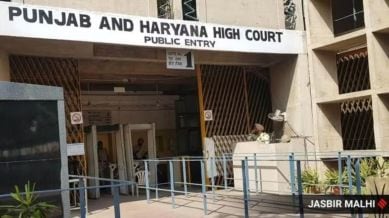Stay updated with the latest - Click here to follow us on Instagram
Punjab and Haryana HC directs training of deputy commissioners, magistrates on SARFAESI Act, warns of contempt for delays
Chief Justice Sheel Nagu said that deputy commissioners, especially of Punjab, do not follow Section 14 under which they have to help lending banks take physical possession of secured assets when lenders default.

Taking serious note of repeated delays by district magistrates in implementing orders under Section 14 of the Securitisation and Reconstruction of Financial Assets and Enforcement of Security Interest (SARFAESI) Act, the Punjab and Haryana High Court Wednesday directed the Chandigarh Judicial Academy to conduct orientation courses for deputy commissioners and chief judicial magistrates of Punjab, Haryana and Chandigarh within a month.
A division bench of Chief Justice Sheel Nagu and Justice Ramesh Kumari observed that despite clear judicial directions, district magistrates and subordinate revenue officers often “sit over files” for months, frustrating the very scheme of the SARFAESI Act. Section 14 empowers the district magistrate or chief judicial magistrate to assist banks in taking possession of secured assets once default has been established.
monthly limit of free stories.
with an Express account.
“It is surprising that time and again, this court is confronted with petitions where banks complain that orders under Section 14 have not been executed,” Chief Justice Nagu remarked, adding that the law envisages passing of such orders within 30 to 60 days and their execution without delay. “Merely because the statute does not prescribe a specific time frame for execution does not mean officials can let files gather dust,” the bench noted.
The court pointed out that a coordinate bench in May 2024 laid down detailed procedures for district magistrates to follow while dealing with Section 14 applications. Yet, several officials either remain unaware of the order or are “intentionally not complying with it”, the bench said.
During the hearing, counsel for banks highlighted that higher-value cases—often running into hundreds of crores—faced the longest delays, allegedly due to political or extraneous considerations. “Smaller borrowers’ cases get decided quickly, but in cases involving ₹100 crore and above, district magistrates either delay passing orders or do not implement them,” the bench was told.
Rejecting any distinction between high- and low-value cases, the Chief Justice said: “Debt recovery cannot be based on the amount involved. Applications should be dealt with on a first-in, first-out basis.”
To address the widespread non-compliance, the bench ordered the Judicial Academy to hold a training programme for all deputy commissioners, district magistrates, and chief judicial magistrates. “After participation, it is expected that they will perform their statutory duty of passing orders within 60 days and ensuring their execution expeditiously,” the bench directed.
The court also issued a stern warning: if any district magistrate or deputy commissioner is found failing to comply with their duty under Section 14 after undergoing orientation, it would amount to contempt of court.
The bench further underlined that the powers exercised under Section 14 are “ministerial in nature” and do not involve any adjudicatory function. Referring to Supreme Court rulings, including R D Jain vs Capital First Ltd. (2023) and NKGSB Cooperative Bank vs Subir Chakravarty (2022), the judges reiterated that district magistrates are not quasi-judicial authorities in such matters and must act swiftly to aid banks.
The order comes amid mounting complaints from banks across Punjab and Haryana about delays in recovering secured assets, particularly in cases where local political influence or farmer unions resist execution. The bench concluded that fixing accountability and providing orientation were now essential to ensure the law serves its intended purpose.